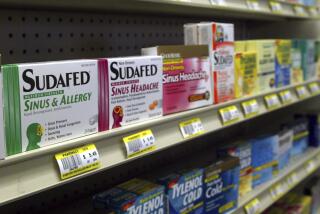Vast Array of Remedies Is Nothing for Allergy Sufferers to Sneeze At : Health: Spring is the season of sniffles, and drugstore shelves are lined with dozens of medications. The trick is to pick the one that’s right for you.
- Share via
WASHINGTON — The National Institute of Allergy and Infectious Diseases estimates that more than 22 million Americans suffer from hay fever. The Asthma and Allergy Foundation of America adds that in children under 18, it is the most frequently reported chronic condition.
Many allergy sufferers look to the shelves of the drugstore for relief. Deciding among the myriad remedies, including over-the counter syrups or pills, time-release or fast-acting formulas, decongestants or antihistamines, could make anyone’s eyes red.
“It’s no wonder people get confused,” said Leslie Hendeles, a clinical pharmacist at the University of Florida, who has studied antihistamines for a decade. “The problem is, they go into a drugstore and there is a gondola filled with these products.”
Marketing strategies can make the choice even more difficult. For example, Drixoral Plus and Drixoral Sinus contain exactly the same ingredients in the same amounts. Only the names have been changed to match the symptoms.
For allergies, the basic medication recommended by doctors is antihistamines. The symptoms of hay fever--sneezing, sniffling, running noses and itchy eyes, mouth and throat--are caused by histamine, which is released by special cells in the lining of the nose and eyes when the body forms antibodies to pollen, dust or mold. Chemicals called antihistamines counter the effects of histamine.
Sometimes these symptoms in hay fever and colds are accompanied by stuffiness, which is caused when excess fluids move into tissue and blood vessels dilate. Medicines called decongestants contract those blood vessels to help ease this reaction.
Antihistamines such as chlorpheniramine (Chlor-Trimeton) or diphenhydramine (Benadryl) often cause drowsiness because as they travel through the bloodstream they are able to permeate a membrane and enter the brain, where they sedate the central nervous system. A couple of non-sedating antihistamines--Seldane and Hismanal--are available by prescription.
Over-the-counter antihistamines come in a variety of strengths and combinations with other drugs. Doctors generally advise patients to buy the individual medicines rather than combinations.
Antihistamines can last four, eight or 12 hours. Some contain a decongestant as well, and one, for “sinus,” combines an analgesic (acetaminophen) with the antihistamine and the decongestant. According to Hendeles, some people “confuse sinus disease with allergic rhinitis (hay fever). For some people who get sinus headaches, a decongestant combined with acetaminophen is a very rational thing,” he said, “but there’s no reason to take an antihistamine with it.” He recommends that consumers examine the package carefully, keeping in mind that:
* Antihistamines provide relief for sneezing, running and itching noses and eyes, but not stuffiness, and they do not work on colds.
* Decongestants relieve stuffiness of colds and hay fever.
* Analgesics (aspirin, ibuprofen, acetaminophen) ease pain.
* Sinus and ear infections, often accompanied by fever, need to be treated by a physician.
On the basis of studies he has done, Hendeles said people who know which season will cause them trouble can start a few days ahead of time with a dose of antihistamine at night (when the drowsiness won’t matter), gradually building up to three or four a day during the height of the pollen season. The early start helps keep allergic reactions in check, Hendeles said, and the drowsiness that is a serious problem with antihistamines disappears in about a week.
Other strategies to combat hay fever, said Richard Rosenthal, Fairfax (Va.) Hospital’s chief of allergy, are to seek immunizations, or avoid exposure to the allergens--possibly by moving to an area with fewer pollens in the air.
For most people with some allergies, relocating is not an option. Rosenthal suggests spending as much time indoors as possible during the high pollen season. While inside, use air conditioning with special filters.
For folks who sneeze year-round, shots could be helpful, Rosenthal said.





